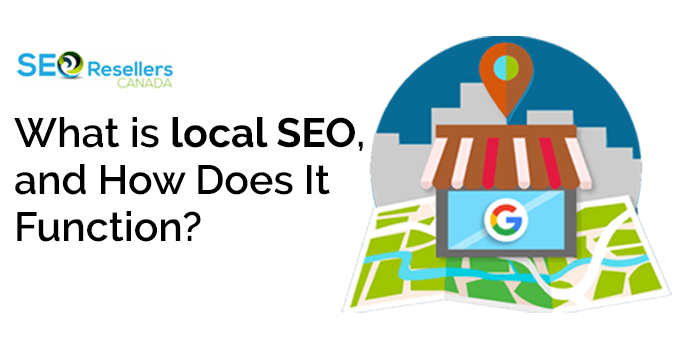When you hire an expert for SEO outsourcing, they will recommend various techniques to get your visibility ahead of your competitors. But you will notice one common term that keeps popping up in various discussions you have with them – Keywords.
Let’s see what Kelowna SEO consultants mean when they refer to a keyword. We will also look at some actionable ways to get the right keyword that will derive better outcomes for your specific SEO campaigns.
1- What is a keyword?
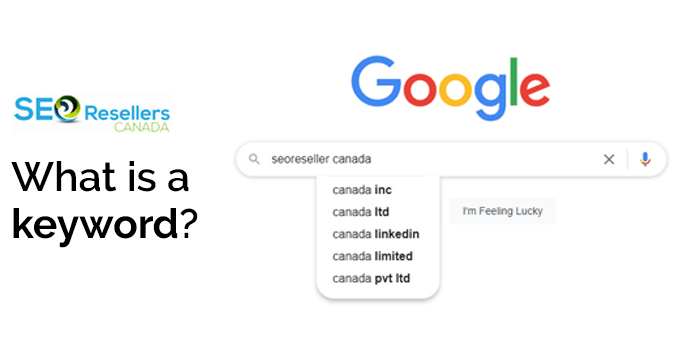
Remember that 93 percent of all online experiences start with a search engine like Google, Bing or Yahoo. This means that when a person wants to buy something or look for information, she will start with a search engine and then be redirected to a site based on the results shown by these search engines.
Now the search user may type in a few words to find information. This is known as a search query for the user. And this text string becomes a keyword for the business.
At Google’s end, the search engine takes these user queries and shows the results of pages that have these queries mentioned in the content.
2- What is keyword research?
With keyword research services, you can be sure of knowing which search terms your potential customers would feed into the search bar to use for a specific purpose. When your content has these keywords blended with valuable information, you stand a better chance of ranking higher on the Google search results page (SERP).
Finding the ideal keyword fits into the underlying principle of inbound marketing content creation. We don’t create content around what we want to show customers. We create content around what customers want to know.
It is widely agreed that the right keywords can make or break an SEO campaign. Hence an expert in white label SEO will always spend a lot of time (and effort) in selecting the right keywords.
But how to select the right keyword that will help your SEO campaign run in the fifth gear?
Let’s find out!
3- How to pick the right keywords?
3.1- Factor in search intent
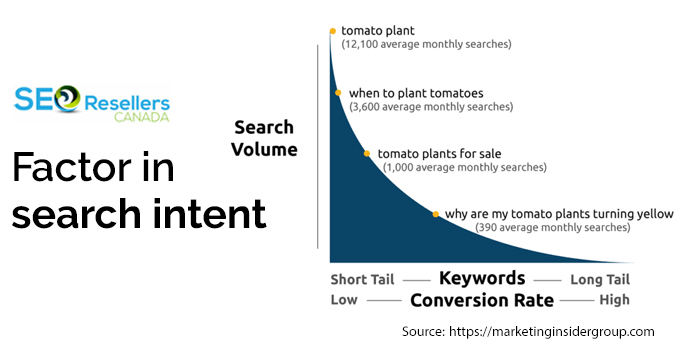
The organic SEO results are impacted a lot with the recent emphasis of Google algorithms like Hummingbird that want to anticipate the needs of the searcher. The search intent helps the search engine to anticipate the needs of the searcher and display the right results.
With search intent, the SEO service provider can use keywords that align with the purpose of the search initiated by users.
Here are the three types of search intent a link building company focuses on –
Navigational – the searcher is looking for another web page
Informational – the searcher is looking for information on a particular topic
Commercial – the searcher has done the initial research and is ready to make a purchase
You can streamline website designing in a way that different pages help the buyer journey to progress ahead smoothly till the eventual conversion. The SEO consultants will try to align search intent with the buyer journey and then determine the right keywords. They will have different landing pages for “buy Nike Sports shoes size 12” (transactional intent) and “tips to clean your sneakers and shoes” (informational intent).
3.2- Create a keyword list
Once you know the search intent, you can create a bucket full of keywords. Don’t worry about competition or CPC for now. You can use the Google keyword planner tool. While many marketers would use it for paid ad (PPC) campaigns, the truth is that it makes for a great starting point for SEO keyword research too. Here are some steps to get started
- Create a Google Ads account and tap on the ‘Planner’ -> ‘Google Keyword Planner.’
- Go to ‘Find New Keywords’, type a keyword related to your service/product, and click “Get Started.”
- The tool gives you a list of related keywords, plus some insightful data on each keyword
You can repeat the process with other tools like SEMrush and Google Suggest. The latter is completely free to use. All you need to do is fire up a search and type in the first few keywords. The search engine will show related suggestions. The best part is that you need not verify its popularity. If they are shown by Google, it means that they are popular among the target audience presently.
3.3- Narrow the list based on competition for the keyword
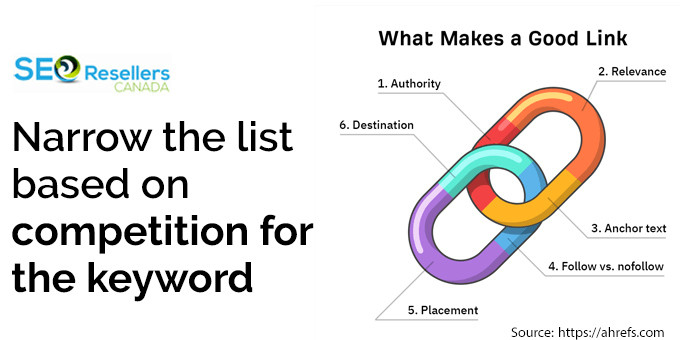
Every keyword has a certain level of competition associated with it. Keywords that are high in competition are very hard to rank. Keywords with low competition are easy to rank. The organic SEO company in Kelowna would put in their effort in working towards these low-competition keywords.
You can use tools like MozBar that show the DA (domain authority) and PA (page authority). In general, the lower the DA and PA, the lower will be the competition.
However, an experienced link building company will vouch that it is not simple to find the accurate difficulty of each keyword. This is because Google uses hundreds of ranking signals, and some of them aren’t even verified even by Google.
3.4- Monthly search volume analysis
Now the SEO service provider will check for the monthly search volume to narrow down the list of low-competition keywords. If the search volume is high, it means that a lot of people are searching for that keyword. Go to Google Keyword Planner -> Average monthly searches (for each keyword)
Some tools may pick the monthly search volume right from the Google Keyword Planner tool. Some other tools like Moz Pro will look at clickstream data (the information collected when a user browses through a website).
Now, you need to determine if the monthly search volume is actually high based on your industry. For example, the running shoe industry caters to B2C and will have a high search volume. So (suppose), a monthly search of 25K will be less. But if it is a highly targeted B2B industry like digital marketing, then 25K search volume will be good.
3.5- Check the top of page bid
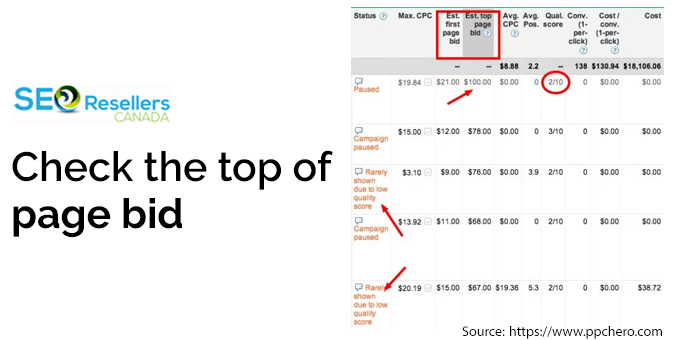
The ‘top of page’ bid in the Google Keyword Planner tool shows how much it costs to place a Google ad and get a click. So, if the cost is high, it means that the keyword is worth more. An SEO outsourcing company in Kelowna will look at a variety of factors at this stage, including –
- Competition
- Search intent
- Monthly search volume
Other than the money value, you also need to check how well a keyword fits your product offering. In this phase of extracting the ideal keywords, the SEO consultants will see if any good keyword is related to the product being sold.
So, suppose, if you are in the IT training business, your organic SEO company will create content around related terms like “IT security”, “technology trends in 2022” and so on.
The idea is that if the target customer for an IT training company lands on your content for “IT security”, “technology trends in 2022” and so on, then they will be more likely to convert for your IT training business. The understanding is that the business (or person) who searches for related keywords will also be a part of the demographic targeted by your business.
3.6- Assess the CTR on organic searches
An experienced keyword research services expert will factor in the click-through rate or CTR.
CTR = Users who clicked on a link in SERP ÷ Users who saw the link on SERP
But be careful when you consider CTR. IT may happen that due to various Google snippets, users may not even have to click on a link to get the information they are looking for. These rich snippets include a shopping carousel, featured snippets, videos, images, and ‘People also ask’ that prevent a positive CTR in your brand’s favour.
So, what can be done to get a fairly accurate measure of the CTR?
Here’s what a white label SEO expert in Kelowna would do
- Check the appearance of the SERP. If there is a simple list of results with meta titles and meta descriptions one after the other, then it may present a true CTR ratio.
- But if an SERP shows a lot of featured snippets, videos, images, and ‘People also ask’, then not many people will see organic results (or even click on it)
Now correlate this result with the ‘top of page’ bid for that keyword. If it is high enough, then it is still worth pursuing, even with the cluttered top half that prevents a searcher from clicking on organic results links.
3.7- Take the help of Google Trends

Understanding your client’s needs goes a long way in bolstering your online business. Google Trends helps you do precisely that. It is a powerful tool that can speed up the SEO consultant’s task of finding valuable keywords. The free tool helps assess the popularity of any search term.
Some of the tasks that can be performed with Google Trends include
- Track searcher behaviour and preferences when typing search queries
- Compare search volumes across multiple search queries
- Come up with seasonal keywords
To start, the local SEO expert will visit Google Trends and type a target query. Please note that the number is not a search volume but a number between 0 and 100. So, if a term has a score of 0, it means that nobody is searching for it. If a search term has a score of 100, it denotes the peak popularity of the term.
The term can be a part of the topic, a search term, or a media (like images and videos) in the SERP. You will see a graph that shows the score at different points in time. Above the graph, you can use 4 filters to tweak the result as per your preferences.
- Geo Location (either United States or Worldwide or any other country)
- Timeline (e.g. past 4 hours, 7 days, 30 days, or even past 5 years)
- Categories (e.g. Arts and entertainment, Beauty and fitness, Finance, or Internet & Telecom)
- Web search (image search, news search, Google shopping, YouTube search)
So if you have a seasonal demand for a product, you can start preparing valuable content beforehand and make full use when the season sets in. It can also help the link building company to review existing pages and update content as per what people are searching for.
But most importantly, it will help SEO companies in Canada know which way the trend is going for a particular search term. After all, you wouldn’t want to target keywords that are continuously dropping in popularity.
4- To conclude
Remember that the golden principle of keyword research is simple. As marketers, you need to uncover what the users are searching for on Google. This helps you know target customers better. As a result, you are better prepared to answer their queries, form trust in their mind, and ensure a better likelihood of engagement and conversion. This is enabled largely by keywords and other SEO initiatives.
When you find the right keywords, you can optimize your content and enrich it with these keywords. This will help your site rank higher on search results pages, thereby driving more targeted traffic to your site.
It won’t be wrong to say that SEO is meaningless without the right keywords. Hope this post will help you find the right keyword that will catapult your online visibility and get you amazing site traffic numbers.












